必修五unit1知识点总结
英语必修五第一单元课文知识点
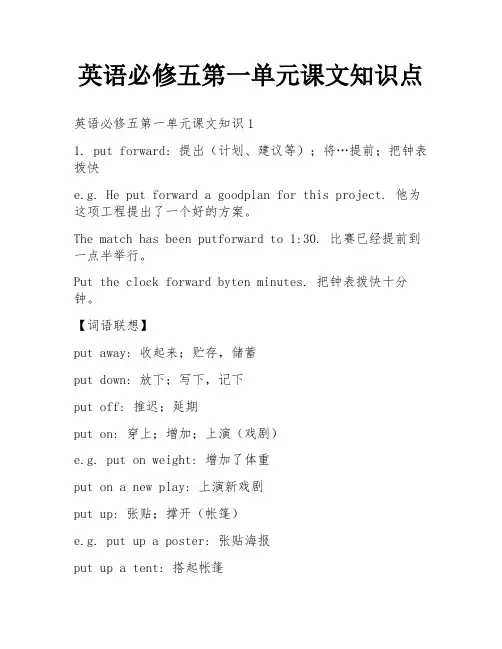
英语必修五第一单元课文知识点英语必修五第一单元课文知识11. put forward: 提出(计划、建议等);将…提前;把钟表拨快e.g. He put forward a goodplan for this project. 他为这项工程提出了一个好的方案。
The match has been putforward to 1:30. 比赛已经提前到一点半举行。
Put the clock forward byten minutes. 把钟表拨快十分钟。
【词语联想】put away: 收起来;贮存,储蓄put down: 放下;写下,记下put off: 推迟;延期put on: 穿上;增加;上演(戏剧)e.g. put on weight: 增加了体重put on a new play: 上演新戏剧put up: 张贴;撑开(帐篷)e.g. put up a poster: 张贴海报put up a tent: 搭起帐篷2. conclude: v. 作结论,断定e.g. The jury concludedthat he was guilty. 陪审团认定他有罪。
conclusion: n. 结论【习惯用语】★ draw a conclusion 作出结论3. defeat vt.打败, 击败, 战胜;使(希望, 计划等)失败, 挫败; 阻挠, 使无效e.g. He finally conceded defeat. 他最终承认了失败。
◆区别: defeat, conquer, overedefeat 指“赢得胜利”, 尤其指“军事上的胜利”,e.g. defeat the enemy 打败敌人。
conquer指“征服”、”战胜”,特别指“获得对人、物或感情的控制”e.g. conquer nature 征服自然。
overe指“战胜”、“压倒”、“克服”尤指“感情”而言,e.g. overe difficulties 克服困难。
新课标高中英语必修5 Unit 1重点知识点
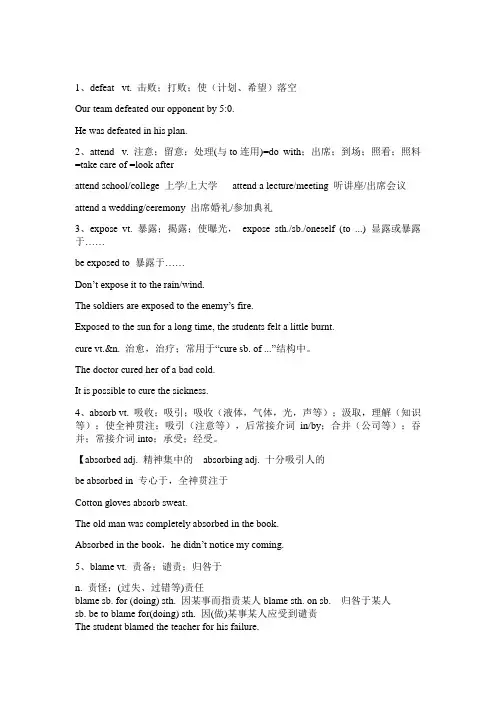
1、defeat vt. 击败;打败;使(计划、希望)落空Our team defeated our opponent by 5:0.He was defeated in his plan.2、attend v. 注意;留意;处理(与to连用)=do with;出席;到场;照看;照料=take care of =look afterattend school/college 上学/上大学attend a lecture/meeting 听讲座/出席会议attend a wedding/ceremony 出席婚礼/参加典礼3、expose vt. 暴露;揭露;使曝光,expose sth./sb./oneself (to ...) 显露或暴露于……be exposed to 暴露于……Don’t expose it to the rain/wind.The soldiers are exposed to the enemy’s fire.Exposed to the sun for a long time, the students felt a little burnt.cure vt.&n. 治愈,治疗;常用于“cure sb. of ...”结构中。
The doctor cured her of a bad cold.It is possible to cure the sickness.4、absorb vt. 吸收;吸引;吸收(液体,气体,光,声等);汲取,理解(知识等);使全神贯注;吸引(注意等),后常接介词in/by;合并(公司等);吞并;常接介词into;承受;经受。
【absorbed adj. 精神集中的absorbing adj. 十分吸引人的be absorbed in 专心于,全神贯注于Cotton gloves absorb sweat.The old man was completely absorbed in the book.Absorbed in the book,he didn’t notice my coming.5、blame vt. 责备;谴责;归咎于n. 责怪;(过失、过错等)责任blame sb. for (doing) sth. 因某事而指责某人blame sth. on sb. 归咎于某人sb. be to blame for(doing) sth. 因(做)某事某人应受到谴责The student blamed the teacher for his failure.The careless driver is to blame for the traffic accident yesterday.Who is to blame for the failure?be to blame 应负责(无被动形式)6、link vt. 连接;联系n. 环;连接;联系;纽带【link ...to/with 将……和……连接/联系起来link up 连接起来The highway links Shanghai to/with Beijing. 重点短语put forward 提出(意见、建议);推荐;提名;将表拨快He put forward a better plan.He puts forward several interesting plans.look into 调查;了解;研究;朝……里面看look into与one’s face/eyes等连用,表示“注视”。
高二英语必修五unit1知识点
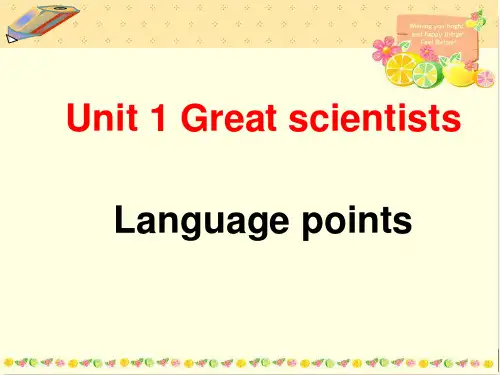
absorb one’s attention 吸引某人的注意力
be absorbed in sth.
专心于某事
be absorbed by/into 被……吞并;为……所吸收
Clever children absorb knowledge easily. He is absorbed in his business.
3、难点
过去分词作定语,表语
一、重要词汇拓展
1.science n.科学 →scientific adj.科学的→ scientist n.科学家 2. announce v.宣布 →announcement n.宣布→ announcer n.广播员,告知者 3. instruct v..指导,命令 →instruction n.指导,指示→ instructive adj.有益的,教育性的 4. enthusiastic adj.热心的,热情的 →enthusiasm n.狂热,热心→ enthusiast n.热心家,狂热者 5. valuable adj.有价值的 →value n. 价值 → value v. 估价, 评价
3. Neither its cause nor its cure was understood. ▲cure vt.&n. 治愈,治疗法;常用于cure sb. of ...结构中。
【易混辨析】
treat和cure
(1) treat强调治疗过程。 treat还可作“对待;看待;款待;请客”讲。 treat sb for sth 医治某人……病 treat...as...把……看作/视为…… treat sb to...请某人……
▲ be exposed to 暴露于……
高手过招
高中英语必修五unit1知识点
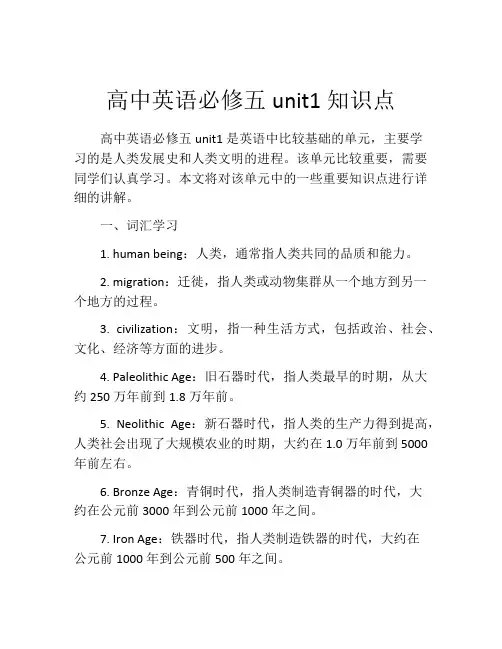
高中英语必修五unit1知识点高中英语必修五unit1是英语中比较基础的单元,主要学习的是人类发展史和人类文明的进程。
该单元比较重要,需要同学们认真学习。
本文将对该单元中的一些重要知识点进行详细的讲解。
一、词汇学习1. human being:人类,通常指人类共同的品质和能力。
2. migration:迁徙,指人类或动物集群从一个地方到另一个地方的过程。
3. civilization:文明,指一种生活方式,包括政治、社会、文化、经济等方面的进步。
4. Paleolithic Age:旧石器时代,指人类最早的时期,从大约250万年前到1.8万年前。
5. Neolithic Age:新石器时代,指人类的生产力得到提高,人类社会出现了大规模农业的时期,大约在1.0万年前到5000年前左右。
6. Bronze Age:青铜时代,指人类制造青铜器的时代,大约在公元前3000年到公元前1000年之间。
7. Iron Age:铁器时代,指人类制造铁器的时代,大约在公元前1000年到公元前500年之间。
二、语法学习1. 主谓一致:主语和谓语在数上要保持一致。
例如:The history of human beings is rich and interesting. 人类的历史是丰富而有趣的。
2. 时态的使用:需要根据叙述的时间,选择合适的动词时态。
例如:In the past, human beings lived in caves. 过去,人类住在洞穴里。
Today, human beings live in comfortable houses. 现在,人类住在舒适的房子里。
3. 介词的使用:需要正确使用介词,以表达出完整和准确的意思。
例如:The early humans had to struggle against nature. 早期的人类必须与自然斗争。
4. 特殊句子的使用:需要注意特殊句子的使用,例如:If the human beings had not learned to control fire, their development would have been greatly limited. 如果人类没有学会控制火,他们的发展将受到严重限制。
高中英语必修5unit1知识点讲解
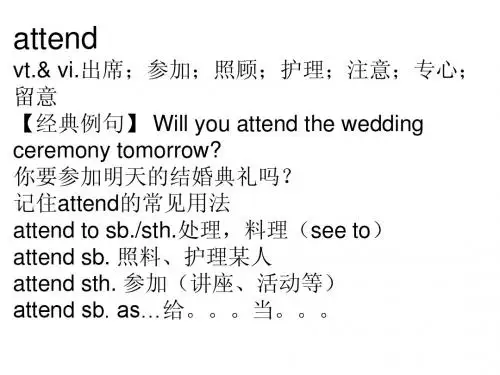
错点二 误接不定式的复合结构作宾语 汉语通常说“建议某人做某事”,但英语习惯 上不能说 suggest sb to do sth,而说suggest sb’s [sb]doing sth. 或后接 that 从句的形式来表达此意 思(注意谓语用 “should+动词原形”这样的虚拟 语气形式)。 他建议我们早点动身。 正:He suggested our (us)leaving earlier. 正:He suggested that we should leave earlier. 误:He suggested us to leave earlier.
When I entered,he was absorbed in reading a novel. We can absorb what we need from foreign languages.
suspect vt. 怀疑;n.嫌疑犯;adj.不可靠的
suspect sb.of ....认为某人有……的嫌疑 suspect sb.to be 怀疑某人是…… ⑴ He is suspected of murder. ⑵ I suspected him to be the spy. ⑶ What made you suspect her of having taken the money?
handle n.& v. 把手,处理;操纵 【经典例句】 Do you know how to handle the computer? 你知道怎样 使用这台电脑吗? 【考点聚焦】 当handle意为“处理”时,相当于deal with.
she had it delivered to her house … 她派人或露出某事物 expose sth./sb./oneself (to sth.)显露或暴露 人/某事物/自己 exposed adj.(指地方)无遮蔽的;不遮挡 风雨的 be exposed to暴露于……
高二英语必修五unit1知识点
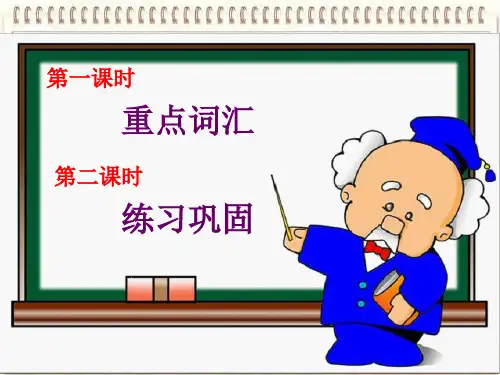
▲absorb意为“吸收;吸引;使专心;合并;吞并”,常见结构: absorb one’s attention 吸引某人的注意力 be absorbed in sth. 专心于某事 be absorbed by/into 被……吞并;为……所吸收
Clever children absorb knowledge easily. He is absorbed in his business.
3、难点
过去分词作定语,表语
一、重要词汇拓展
1.science n.科学 →scientific adj.科学的→ scientist n.科学家 2. announce v.宣布 →announcement n.宣布→ announcer n.广播员,告知者 3. instruct v..指导,命令 →instruction n.指导,指示→ instructive adj.有益的,教育性的 4. enthusiastic adj.热心的,热情的 →enthusiasm n.狂热,热心→ enthusiast n.热心家,狂热者 5. valuable adj.有价值的 →value n. 价值 → value v. 估价, 评价
3. He placed a fixed sun at the centre of the solar system with the planets going round it …..
(with + 宾语+ v. –ing构成的复合结构在句中通常作为状语)
1. John Snow defeats “King Cholera”. ▲defeat意为“击败;打败;使(计划,希望)落空”。
【易混辨析】
defeat, beat与win defeat, beat都表示在战斗或竞赛中“战胜,打败(对手)”,后接竞争对手。如 I can beat/defeat you at swimming. win也表示“战胜,赢得”,但宾语通常是比赛、战争、奖品或表尊重、崇拜之 类意义的词。
必修5unit1知识点
e.g. There's no cure for AIDS. 治疗艾滋病尚无良方。 [(+for)]
4. So many thousands of terrified people died every time there was an outbreak. 每次爆发霍乱时,就有大批惊恐的老百姓病死.
e.g. He blamed you for the neglect of duty. 他责备你怠忽职守。
8. With this extra evidence John Snow was able to announce with certainty that polluted water carried the virus.
1.John Snow was a famous doctor in London--so expert, indeed, that he attended Queen Victoria as her personal physician. 约翰.斯诺是一位著名的医生----他的确医术精 湛,以至成为照料维多利亚女王的私人医生. attend v. (1) 照看,照料.
attend a wedding 出席婚礼
2. But he became inspired when he thought about helping ordinary people exposed to cholera. 但是当他一想到要帮助那些得了霍乱的普通百姓
时,他就感到很兴奋. (1)exposed to cholera 在句子中是过去分词 用作后置定语,表示被动.意为 “患霍乱的”.
高二英语必修5unit1知识点
高二英语必修5unit1知识点高二英语必修5 Unit 1 知识点Unit 1: Great Scientists本单元主要介绍了一些伟大的科学家及其重要发现的知识点。
以下是本单元的知识要点:1. 托马斯·爱迪生(Thomas Edison)- 美国发明家和企业家- 创造了电灯、留声机等众多发明- 他的发明对现代科技产生了深远的影响2. 亚历山大·格雷厄姆·贝尔(Alexander Graham Bell)- 苏格兰裔美国科学家、发明家和教育家- 发明了电话,这一发明引领了通信革命3. 汤姆逊(Tomson)- 英国物理学家- 发现了电子,为后来的电子学奠定了基础- 曾获诺贝尔物理学奖4. 约翰·戴尔顿(John Dalton)- 英国化学家和气象学家- 创立了原子理论,为现代化学奠定了基础5. 爱因斯坦(Albert Einstein)- 德裔美籍犹太人,理论物理学家- 发现了相对论和光量子假设- 他的发现对于现代物理学产生了巨大影响,曾获诺贝尔物理学奖6. 牛顿(Isaac Newton)- 英国物理学家、数学家和天文学家- 发现了万有引力定律和三大运动定律- 他的贡献奠定了经典物理学的基础7. 伽利略(Galileo Galilei)- 意大利物理学家、数学家和天文学家- 运用望远镜证明了地球绕太阳转,站在科学与教会之间的冲突中- 他的实验奠定了现代天文学的基础8. 达尔文(Charles Darwin)- 英国博物学家、生物学家- 提出了进化论,对现代生物学产生了深远的影响- 他的著作《物种起源》改变了人们对生命起源和发展的认识9. 奥斯特瓦德(Gregor Mendel)- 捷克奥地利籍的匈牙利籍的神父和生物学家- 发现了遗传规律,创建了现代遗传学- 他的实验为后来的分子生物学和遗传工程奠定了基础10. 居里夫人(Marie Curie)- 波兰物理学家和化学家- 发现了镭元素,为放射性理论及现代核物理学的发展做出了重大贡献- 是第一个获得两次诺贝尔奖的女性科学家总结:本单元我们了解了一些伟大的科学家及其重要发现,这些科学家们的贡献对于人类的科学发展产生了深远的影响,改变了我们对于世界和宇宙的认识。
英语必修五第一单元知识点
英语必修五第一单元知识点一、词汇与短语1. 高级词汇的学习和运用,如:elaborate, perspective, contradict, etc.2. 短语动词的理解和应用,例如:look forward to, break down, etc.3. 常见搭配,如:make a decision, have an impact on, etc.二、语法1. 复杂句子结构,包括宾语从句、定语从句和状语从句。
2. 时态的使用,特别是过去完成时和将来进行时。
3. 语态的变化,包括被动语态的构成和使用场合。
三、阅读理解1. 快速阅读技巧,如扫读和略读。
2. 理解文章主旨和细节信息。
3. 分析作者意图和态度。
四、写作技巧1. 论证文的写作,包括论点的提出、论据的选取和论证的结构。
2. 描述性和叙述性文章的写作。
3. 正式和非正式写作风格的区别和应用。
五、听力理解1. 理解不同口音和语速的英语。
2. 抓住关键信息和细节。
3. 通过上下文线索理解难词和表达。
六、口语表达1. 发音的准确性和流利性。
2. 日常对话和讨论中的话题展开。
3. 公共演讲和表达观点的技巧。
七、文化知识1. 了解英语国家的文化习俗和社会行为规范。
2. 英语文学的基本知识,如著名作家和作品。
3. 当代英语国家的社会问题和发展趋势。
请注意,以上内容是一个示例性的概要,实际的教学内容可能会有所不同。
教师和学生应参考具体的教材和课程大纲来准备和复习。
此外,为了确保文档的可编辑性和可操作性,建议使用Word或其他文字处理软件来创建文档,并保存为兼容的文件格式,以便用户下载和编辑。
高二英语必修五第一单元知识点讲解(重要)
必修5 Unit1 Great scientistsPart 1. Warming up1.explain及物动词(vt.)解释;说明;阐明[(+to)][+wh-][+(that)]He explained that he had been cheated. 他解释说他是上当受骗了。
Can you explain how the machine operates?你能解释一下这机器是如何运转的吗?Please explain this rule to me.请给我讲解一下这条规则。
不及物动词(vi.)解释;说明;辩解I've got to explain about it. 我得解释一下此事。
2.characteristicn. 特征;特性Kindness is one of his characteristics.adj. 独特的I heard my friend’s characteristic laugh.be characteristic of sb./sth. 是.....的特性Such bluntness is characteristic of him. 如此迟钝是他的特性。
3. Who put forward a theory about black holes?put forward 提出(建议等);提名;提前,把时钟往前拨He put forward a new plan. 他提出一个新计划。
May I put your name forward as a possible chairman of the committee?我能否提名你当委员会主席?[归纳拓展]put down 记下;镇压put out 关掉;熄灭put aside 放在一边;储存;保留put off 推迟;延期put up 建造;举起;张贴put on 穿上put away 收好选词填空(put off, put up, put forward, put aside, put out)①The plan that you _____ at the meeting is wonderful.②Many tall buildings were _____ along the road.③Firefighters have been called to _____ the fire in the city center.④He has a little money to _____ for a rainy day.⑤Don’t _____ until tomorrow what can be done today.Part 2. Pre-reading, reading and comprehending1. Do you know how to prove a new idea in scientific researchhow to prove a new idea 为“疑问词+不定式”结构,该结构可在句中作主语、宾语、表语等。
- 1、下载文档前请自行甄别文档内容的完整性,平台不提供额外的编辑、内容补充、找答案等附加服务。
- 2、"仅部分预览"的文档,不可在线预览部分如存在完整性等问题,可反馈申请退款(可完整预览的文档不适用该条件!)。
- 3、如文档侵犯您的权益,请联系客服反馈,我们会尽快为您处理(人工客服工作时间:9:00-18:30)。
1.have1)have sb/sth do sth “让某人/物做某事”,宾语sb/sth和宾补do之间为主动. 如:Mum often has me help do some housework.2)have sb/sth doing sth “让某人/物一直/总是做某事”,宾语sb/sth和宾补do之间为主动,且强调动作一直进行.如:Don't have the machine working all the time.3)have sb/sth done “让某人/物被...”,宾语sb/sth和宾补do之间为被动关系. 如:I had my hair cut yesterday.2.get1)get sb/sth to do sth“使得某人/物去做某事”,宾语sb/sth和宾补do之间为主动关系,且动作尚未发生.如:Can you get us to do the experiment?你能让我们做这个试验吗?2)get sb/sth doing sth “使得某人/物正在做某事”,宾语sb/sth和宾补do之间是主动关系,且动作正在发生.如:He has got the car starting.3)get sb/sth done “使得某人/物被...”,宾语sb/sth和宾补do之间是被动关系. 如:I must get my bike repaired.3.makemake sb/sth do sth “使得某人/物做某事”,宾语sb/sth和宾补do之间是主动关系. 如:His joke made us all laugh.Unit 1 Great scientists ?1. (v.)检查( inspect, check)2. (vt.& vi.) 推断出,结束3. (vt.) 分析( n. analysis)4. (vt.& n.) 打败;战胜,使受挫;失败(beat)5. (vt.) 出席,护理,照顾,参加6. (vt.) 暴露,揭露,使曝光(uncover,unmask, undress,reveal )7. (vt.& n.) 治愈,治疗;痊愈8. (v.) 控制9. (vt.) 吸收,吸引;使专心10. (vt.& n) 责备,谴责;过失,责备(criticize, scold,accuse 反praise)11. (adv.) 立即12. (n.& v.) 把手;处理,操纵(deal with)13. (vt.& vi.) 贡献,捐献,捐助14. (v.) 完成(finish)15. (vt.) 拒绝,抛弃,不接受(refuse/ abandon)16 . (n.) 特征,特性17. (adj.) 严重的(serious),严厉的,剧烈的18. (adj.) 积极的,肯定的,确实的(同active/ optimistic/supportive) (反negative, passive/pessimistic/opposed/object to)19. (adj.) 热情的,热心的(n. enthusiasm)20 . (adj.) 小心的,谨慎的(n. caution) (be~ about)1.得出结论2.提出3.另外,除了4.应受到责备5.对……严格的6.将……和……联系或连接起来7.导致8.讲得通,有意义9.使显露,暴露10. 有助于,导致11. 全神贯注于1.So many thousands of terrified people died every time there was an outbreak .(5th line)此处every time 引导时间状语从句,相当于whenever, 指“每当........”(状元桥P116-117)可作连词用的名词词组1,The +瞬间名词(instant, minute , moment)2,The +序数词(first,second.......)+ time,3,不定代词(each,every, any)+ time4,The day (week,month, year,........)此外,有些副词,如directly,instantly,immediately 也可引导状语从句,意为“一.......就.......”Exercise :1._______________________________to his hometown(每次他回到家乡),he will visit his teacher. (come)2.————————————————(第一次我见到她),I fell in love with her. (see)3.________________________________(你一按按钮), the machine will start.(moment)4.He visited his old friend___________________(他到达的那一天)(arrive)5. He turned on the TV ____________________(他一回到家)(immediately)关于time 的其他用法:1.for the first time 是介词短语,作时间状语,而the first time 是连词,引导时间状语从句如:I met him in the party for the first time.2.It/This/That is/was the first time that.......如果用is,则从句用现在完成时,如果用was,则用过去完成时如:It is the first time that——————(我来到中国)It was the first time that——————(我见到他)3.It is (high/about time) that.......从句用一般过去时如:It is high time that—————————(我们采取措施)to protect our enviroment.(measure)measure)2.It seemed that the water was to blame.(25th line)表达“好像,似乎”的句型It seems/appears that.........It seems /appears/looks as if........(真实/虚拟)Sb/sth seems/appears to do/be ..........sb/sth seems/appears +adj/n.(系表结构)Exercise:他似乎很聪明1,_________________ he is clever.He _____________________.He ______________________.2,It seems as if ___________________(天要下雨了).3,It seemed as if the pen ________________(断了)when we put it in the water ,but actually it wasn’t.(break)(2012 湖北真题)4,Things aren’t always_____________________(appear).事情往往不是它们看上去那样。
4,Neither its cause nor its cure was understood. (5th line) Neither..........nor.........既不.........也不.........谓语遵循就近原则,类似的还有:either........or......... Not only.......but also........... , not.......but........., There be.........., neither /nor 为否定词,置于句首时句子要部分倒装Exercise : (状元桥P116)5,If y ou don’t take part in the meeting,_________________ (我也不参加).(neither) 6,In fact, I didn’t know his total income. ______________________(我也不在乎)how his money was spent. (neither)7,Neither the players nor the coach_________________victory,which may be the reason for their loss.(confident).8,A woman, who..........., liked the water from the pump so much that she had it delivered to her house every day.(42nd line)So/ such .......that........ 如此.......以致于.......So/such 置于句首时要用部分倒装如:————————————(这个地方如此美丽)that I would never forget it. (beautiful)have sth done :让某事被做或表示遭遇如:1.----- where is your computer?--------___________________(我送去修了)in the computer shop.(repair)2.我的钱包被偷了。
___________________(steal)John Snow suggested that the source of all the water supplies be examined. (46th line)常用(should)+ do 在名词性从句中构成虚拟语气的动词一坚持:insist二命令:order , command三建议:advise, suggest, propose四要求:request, require, demand , desire ,( urge )如:1. The teacher requested that all the exam papers_________________ (上交)tomorrow.( hand)It was advised that _________________________(他保持健康的饮食)long time ago , but he didn’t listen . (keep)1.conclude vt.& vi.断定,推断;使结束,终止;达成,缔结(con 全部+clude→全部关掉→结论)include v 包括(in 进入+clude→关进去→包括)2.conclusion n.结束,结论3.in conclusion最后,总之=in a word=in short/brief4.arrive at/come to/draw/reach a conclusion得出结论e to the conclusion that...所得结论是…1.Richardson_______from his studies that gender equality is still a long way off. (状元桥P114)A accountedB concludedC resultedD confirmed2. ___________________ the earthquake led to the great disaster in Japan.(conclude) (状元桥P114)结论是那次地震造成了日本的巨大灾难。
